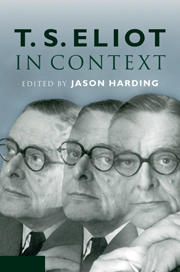Book contents
- Frontmatter
- Contents
- List of illustrations
- List of contributors
- Acknowledgements
- List of abbreviations
- Introduction
- PART ONE LIFE
- PART TWO FORMS
- PART THREE LITERARY CROSS-CURRENTS
- PART FOUR POLITICS, SOCIETY AND CULTURE
- PART FIVE RECEPTION
- 34 Contemporary reviews
- 35 Contemporary and post-war poetry
- 36 Eliot studies
- 37 Legacies: from literary criticism to literary theory
- Further reading
- Index
35 - Contemporary and post-war poetry
Published online by Cambridge University Press: 05 August 2012
- Frontmatter
- Contents
- List of illustrations
- List of contributors
- Acknowledgements
- List of abbreviations
- Introduction
- PART ONE LIFE
- PART TWO FORMS
- PART THREE LITERARY CROSS-CURRENTS
- PART FOUR POLITICS, SOCIETY AND CULTURE
- PART FIVE RECEPTION
- 34 Contemporary reviews
- 35 Contemporary and post-war poetry
- 36 Eliot studies
- 37 Legacies: from literary criticism to literary theory
- Further reading
- Index
Summary
The ‘new bearings’ in English poetry that F. R. Leavis wrote about so positively and authoritatively in 1932 were essentially those established by T. S. Eliot in the poetry up to and including Ash-Wednesday (1930). Leavis is acutely responsive to a poetry that ‘expresses freely a modern sensibility, the ways of feeling, the modes of experience, of one fully alive in his own age’. The epilogue to New Bearings in English Poetry records ‘the decisiveness of Mr Eliot's achievement’ in revising and reordering the tradition of English poetry, but it also harbours reservations about the ‘great deal of discipleship of varying degrees of naïveté and subtlety’ that Eliot has suffered. The imitation of Eliot, he concedes, has ‘become a nuisance and even something of a menace’. Eliot's achievement has cleared the way for serious work, but it has also ‘beguiled a certain amount of young talent into something worse than waste of time’. The likeliest successors are William Empson and Ronald Bottrall, both of whom exhibit an intellectual sophistication and technical control derived from Eliot's example. In ‘Retrospect 1950’, however, Leavis ruefully acknowledges the failure of these poets to develop in any significant way, and he grudgingly observes the popular success of W. H. Auden and his near contemporaries. A general failure of ‘the function of criticism’ and an implied lowering of critical standards are offered as an explanation of ‘why the influence of T. S. Eliot, out of which a poetic revival seemed so likely to come, should have been so sadly defeated’.
- Type
- Chapter
- Information
- T. S. Eliot in Context , pp. 359 - 369Publisher: Cambridge University PressPrint publication year: 2011



